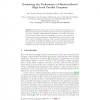Free Online Productivity Tools
i2Speak
i2Symbol
i2OCR
iTex2Img
iWeb2Print
iWeb2Shot
i2Type
iPdf2Split
iPdf2Merge
i2Bopomofo
i2Arabic
i2Style
i2Image
i2PDF
iLatex2Rtf
Sci2ools
118
click to vote
ICCS
2004
Springer
2004
Springer
Evaluating the Performance of Skeleton-Based High Level Parallel Programs
We show in this paper how to evaluate the performance of skeleton-based high level parallel programs. Since many applications follow some commonly used algorithmic skeletons, we identify such skeletons and model them with process algebra in order to get relevant information about the performance of the application, and be able to take some “good” scheduling decisions. This concept is illustrated through the case study of the Pipeline skeleton, and a tool which generates automatically a set of models and solves them is presented. Some numerical results are provided, proving the efficiency of this approach.
Related Content
| Added | 01 Jul 2010 |
| Updated | 01 Jul 2010 |
| Type | Conference |
| Year | 2004 |
| Where | ICCS |
| Authors | Anne Benoit, Murray Cole, Stephen Gilmore, Jane Hillston |
Comments (0)

